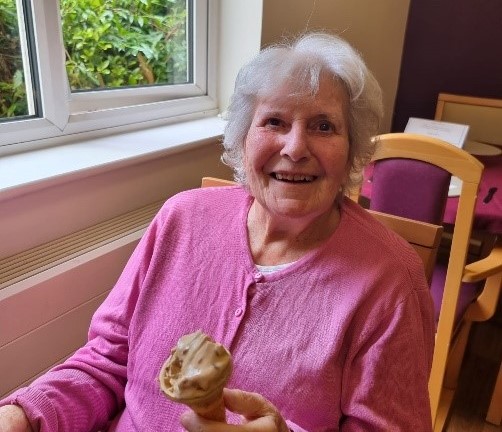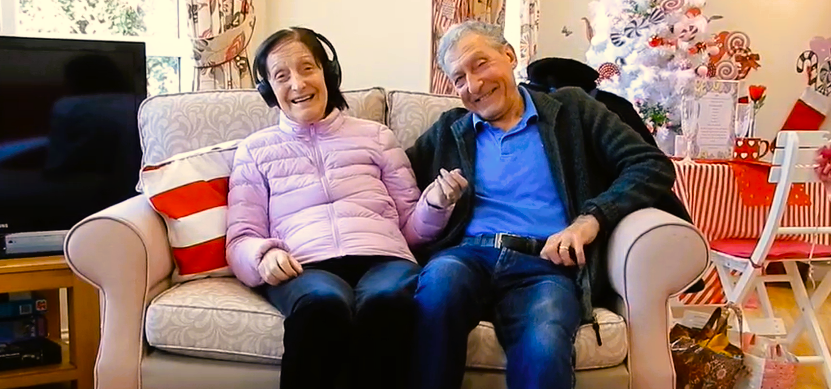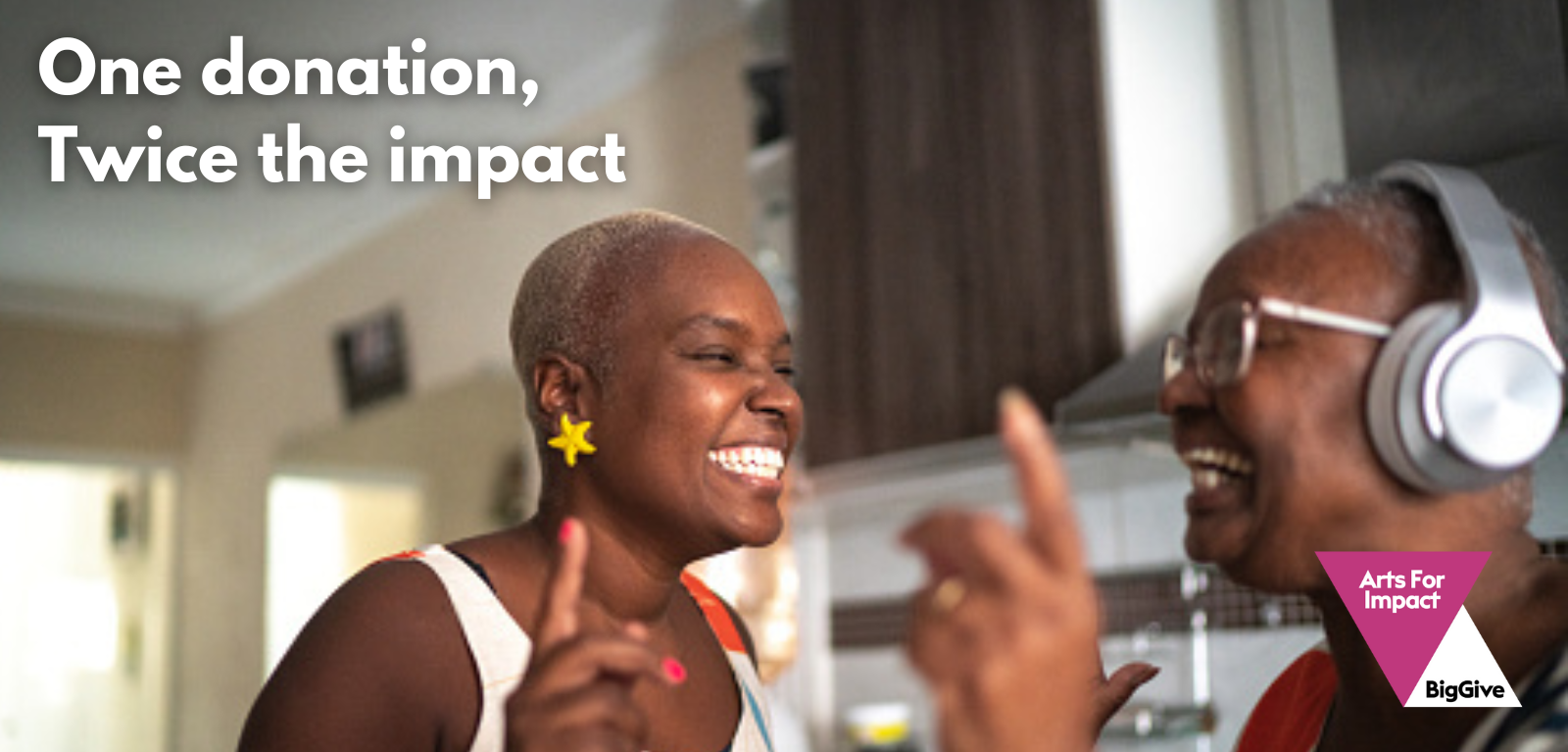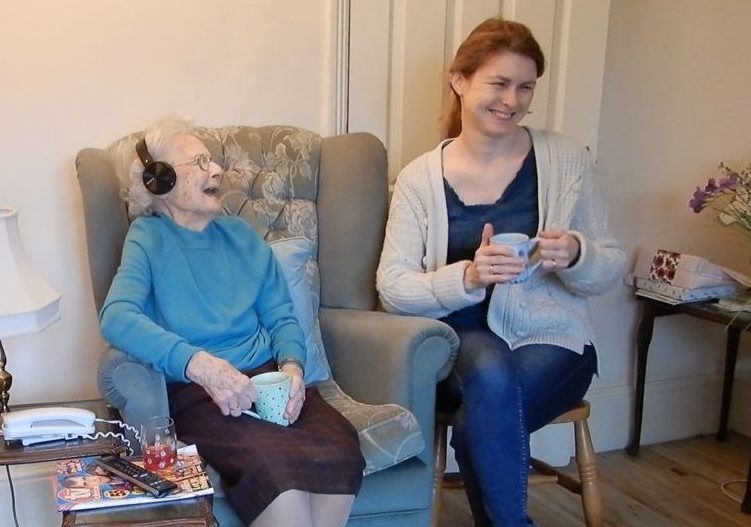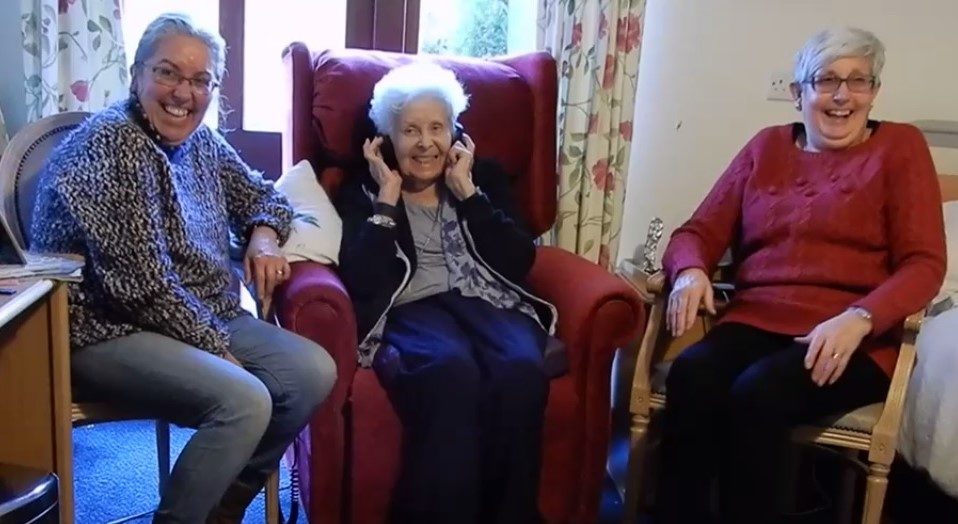“Since staff discovered her love for music, Jean has come out of her shell and is attending activities daily.” This World Alzheimer’s month we bring you Jean’s story.
Continue readingCelebrating Generosity – A Heartfelt Thank You to our Supporters
A huge thank you to everyone who donated to help us raise £26,320 during April’s Arts for Impact appeal! Read how the funds will be spent.
Continue readingMake Double the Difference Supporting our Big Give Appeal
MFMM is thrilled to be participating in the 2024 Arts for Impact campaign from 19-26 March, where donations will be doubled by The Big Give.
Continue readingMusic for my Mind accepts grant from Dementia Research UK
MFMM is delighted to re-start a study using novel tech to measure effects of personalised music on people living
with dementia.
Music for my Mind and Quantum Care re-start study into effects of music in dementia care
MFMM is delighted to re-start a study using novel tech to measure effects of personalised music on people living
with dementia.
The magic of music in dementia care
Music can lift us out of depression or move us to tears – it is a remedy, a tonic, orange juice for the ear. But for many of my neurological patients, music is even more – it can provide access, even when no medication can, to movement, to speech, to life. For them, music is not a luxury, but a necessity. – Oliver Sacks
Continue readingQuantum Care and Music for my Mind
Music for my Mind’s research supported by Quantum Care homes
We are very excited to announce that we have partnered with Quantum Care on conducting our research programme. They are a not-for-profit care home group operating throughout Hertfordshire, Bedfordshire and Essex, serving over 2,000 older people. One of Quantum Care’s core values is providing high quality person centred care, which is essential for us and for the end result we are trying to achieve – bringing benefits for people living with dementia.
Similarly to Music for my Mind, Quantum Care put a strong focus on innovation. One of our charity’s aims is to utilise new technology and make it usable in a care home setting. We are excited by the opportunity to bring new technological solutions for creation and delivery of personalised playlists for their residents.
“We believe that the outcomes of a research project such as this, can have a hugely positive impact not only on our residents but may have significant implications throughout the wider UK dementia care system.” – Debbie Gilard, Head of Corporate Services at Quantum Care
Our project will look to benefit not only the residents from the care homes, but their family members, friends and carers too. Seeking the care home staff’s input and thoughts on how we can create a process that is beneficial to them too, is important to us, as they are the people who work on the frontline of dementia care.
You can read more about the first stages of our work in the Quantum Care homes, in their annual report here.
If you would like to read more about our research programme, visit our Feasibility Studies page.
National Lottery Community Fund Grant Award
We are delighted to announce that our charity has received a grant award from the National Lottery Community Fund!
Continue readingUtilising technology in dementia care
Recent technological developments from the field
As a technology-driven charity, we are excited when we read about all the technological advancements being implemented in the health system and into care, particularly for people living with dementia. We believe that utilising existing technology pieces to improve the quality of life for people with dementia is what the future of care should be.
We’d like to share with you some notable news stories from this field.
– According to the Business Insider, the market for tech products for ageing Baby Boomers is expected to reach $20 billion by 2020. Digital technology is becoming more and more accessible to older people and no longer only aimed at benefiting younger users. Some of the technologies highlighted in the article include robot companions, smart speakers, location trackers, on-demand care service and life-like pets.
Read the full story here: https://www.businessinsider.com/tech-products-for-aging-baby-boomers-patients-with-dementia-2019-1?r=UK.
– It’s been known that reminiscence therapy has many beneficial effects for people with dementia. The ability to immerse yourself in a familiar place and relive precious memories, is exactly what Dorset-based care and support provider Tricuro offers to people with dementia, through Virtual Reality. Day Service Officer Mika Davis said: “When you’ve got a disability, particularly like dementia it closes so many doors and I don’t think people’s pasts should be one of those doors that’s closed.” This experience also allows for a closer connection and bonding between the care home staff and their residents.
For the full story: https://www.wessexfm.com/news/dorset-news/2791314/how-vr-techs-helping-dorset-dementia-patients-share-their-pasts/.
– The power of new technology has also been harnessed in research and diagnosing early stages of Alzheimer’s disease. A research at the University of California San Francisco is working with artificial intelligence to detect very subtle changes in levels of specific molecules in the brain, surpassing the time a clinical diagnosis can be made by six years. “One of the difficulties with Alzheimer’s disease is that by the time all the clinical symptoms manifest and we can make a definitive diagnosis, too many neurons have died, making it essentially irreversible,” says Jae Ho Sohn, MD, MS, a resident in the Department of Radiology and Biomedical Imaging at UC San Francisco. This new method can help diagnosing Alzheimer’s early on, giving the possibility to administer treatments that can help stem the condition’s progression.
For the full story, click here: https://www.ucsf.edu/news/2018/12/412946/artificial-intelligence-can-detect-alzheimers-disease-brain-scans-six-years.
What’s in store for 2019 – looking ahead
Achievements and visions
What have we achieved so far and what we plan to, looking ahead in 2019. The past year has been an inspiring and exciting one for Music for my Mind, filled with incredible support from so many people. Our journey and key milestones so far have included conducting pilot studies in care homes, assembling an influential and highly skilled group of Trustees, staff, advisors and during 2018 – gaining over 350 supporters.
We have developed important partnerships with a range of organisations and individuals who can help us, in the last year most importantly with Quantum Care – a group of care homes excited about innovation and use of technology to improve the quality of life of their residents.
Over the past year we have also been fortunate enough to expand our team and welcome a full-time Project Assistant, Dimana Georgieva. We also have the vital support and advice of many experienced consultants in strategy, fundraising, marketing and technology development.
Looking ahead
With all these achievements, we are raring to go to dive into another year of this exciting journey. Looking ahead, our main activities in 2019 will focus on research and further technology development.
 Research:
Research:
In 2019 we will be undertaking the first phase of social science/mixed methodology research to explore issues such as:
- a systematic review of the literature on music and dementia;
- a favourite songs review by age in non-dementia populations.
- demography in care homes, including
§ stages and severity of dementia,
§ the proportion of residents with relatives and how often they visit,
§ who has power of attorney?
§ drugs being prescribed
§ music and other activities currently being used
We are working on our programme of feasibility studies and accompanying protocols, including consideration of appropriate levels of ethics review. Through this programme, we will explore some key operational questions such as the frequency, timing and length of use of personalised music, impact on sleep or wellbeing, etc.
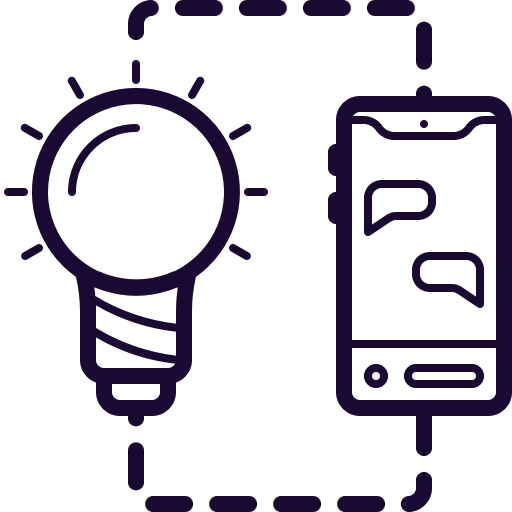 Product development:
Product development:
Our other main are of focus throughout the year is to continue developing a tool for creating and delivering personalised playlists that can easily be used and implemented in care homes. During 2019 we aim to draw up the specification for an app to enable rapid creation of personalised playlists, using existing music delivery services (such as Spotify) and based on people’s musical and behavioural background. This involves a lot of tests and versions, to reach a product that will work best within a range of care settings.
Alongside these two main areas of activity, we will continue to raise awareness about the effects of personalised music for people living with dementia, through different campaigns and initiatives throughout the year. We will also keep our stakeholders and supporters informed of relevant news in this area and other relevant technological or therapeutic advancements.
We at Music for my Mind hope to get much closer in 2019 to our vision for every care home in Britain to have a music programme and for everyone living with dementia to benefit from personalised music as an integral part of the therapy and care they receive.
To support our app development, visit our crowdfunding page to donate.


